物流管理专用英语 物流管理专业介绍
物流管理英文的讲义

13
What is AA
Doing in the Marketplace?
14
Questions to Answer
3 How are you using the FTFOC study?
3 Hot issues/activities for clients and targets
“Expected”
Quadrant I
“Proven”
Quadrant II
“Innovative”
Low
“Differentiated”
Low
GAP
High
Degree to which the practice provides differentiated
profitability or “gap” over non-users
of
CHANGE
Transforming Your Business With
Best Practices
NAW
DREF
16
Objectives of the Study
To provide a compilation of critical trends for management to use in strategic planning efforts
Administration Sales & Marketing
Purchasing Warehousing
Delivery Administration
Past
Present
Future?
Understand Markets & Customers Develop Vision & Strategy Selling & Customer Service
物流管理专业英语作文
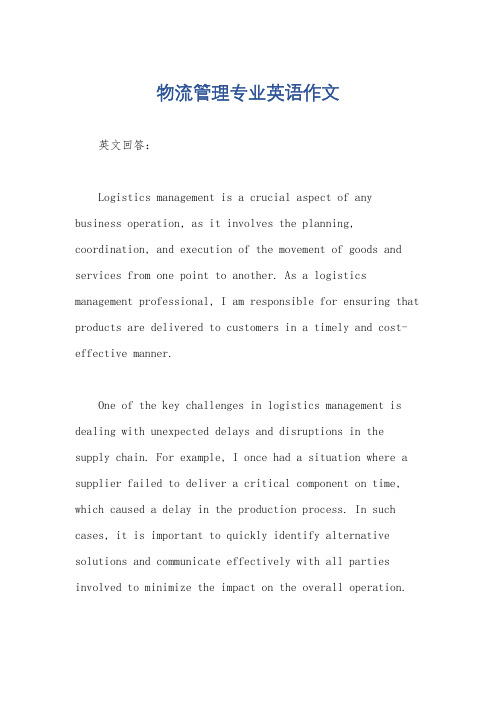
物流管理专业英语作文英文回答:Logistics management is a crucial aspect of any business operation, as it involves the planning, coordination, and execution of the movement of goods and services from one point to another. As a logistics management professional, I am responsible for ensuring that products are delivered to customers in a timely and cost-effective manner.One of the key challenges in logistics management is dealing with unexpected delays and disruptions in the supply chain. For example, I once had a situation where a supplier failed to deliver a critical component on time, which caused a delay in the production process. In such cases, it is important to quickly identify alternative solutions and communicate effectively with all parties involved to minimize the impact on the overall operation.Another aspect of logistics management is optimizing transportation routes to reduce costs and improve efficiency. This involves analyzing data, such as delivery times and fuel consumption, to identify opportunities for improvement. For instance, by using route optimization software, I was able to reduce transportation costs by 15% and improve delivery times by 20%.In addition to managing the physical movement of goods, logistics management also involves overseeing inventory levels and warehouse operations. It is essential to maintain accurate inventory records and ensure that products are stored and handled properly to prevent damage or loss. For instance, I implemented a barcode scanning system in the warehouse to track inventory levels in real-time, which significantly reduced errors and improved efficiency.Overall, effective logistics management requires strong communication skills, problem-solving abilities, and attention to detail. By proactively addressing challenges and continuously seeking ways to improve processes, I amable to ensure smooth operations and customer satisfaction.中文回答:物流管理是任何企业运营中至关重要的一个方面,它涉及到货物和服务从一点到另一点的规划、协调和执行。
物流专业英语

物流管理logistics management客户服务customer service物资搬运material handling订单处理order processing需求预测demand forecasting退货处理return goods handling零配件和服务支持parts and service support工厂及仓库选址factory and warehouse site selection 存货管理inventory management逆向物流reverse logistics产出点point of origin消费点point of consumption物流成本logistics cost销售损失lost sale退货处理成本cost of return goods handling潜在的销售potential future sale运输成本transportation cost进货渠道inbound channel出货渠道outbound channel订单处理成本order processing cost销售沟通distribution communication电子数据交换系统electronic data interchange (EDI) 卫星数据传输satellite data transmission条码bar coding内部成本internal cost外部成本external cost订单传输order transmittal订单输入order entry批量成本lot quantity cost缺货stockout库存持有成本inventory carrying cost资金成本capital cost仓储空间成本storage space cost风险成本risk cost供应链supply chain最终用户end-customer供应链管理supply chain management货物流product flow核心能力core competency信息流information flow人力资源human resource上游供应商upper stream supplier供应链整合supply chain integration下游企业down stream firm物资供应material procurement供应链战略Supply chain strategy虚拟企业Virtual company多数供应商战略Many suppliers strategy 少数供应商战略Few suppliers strategy前向整合Forward integration后向整合Backward integration纵向整合战略Vertical integration规模经济Economy of scale企业集团Keiretsu networks成本降低Cost reduction产品移动product movement门到门door-to-door在途库存in-transit inventory有效利用能源energy-efficient危险品hazardous material灵活性和通用性flexibility and versatility远洋运输Ocean going ships建筑材料building materials价格优势price advantage跨西伯利亚铁路the Trans Siberian railway 多式联运multi-modal transport工业中心industrial center空箱empty container装货地place of loading拼箱groupage container系统化转运systematic transfer公铁运输road-rail transport长距离运输long distance movement LASH lighter abroad shipCFS container freight stationFCL full container loadLEL less than container loadTEU twenty-foot equivalent units资金周转cash flow网络结构network structure运输成本transportation cost运输工具transport vehicle现场仓库field warehouse延期交货订单back-order中间商intermediary客户服务customer service分销渠道distribution channel主生产计划master production schedule库存周转率inventory turnover前置期lead time库存管理inventory management搬运成本carrying cost持有成本holding cost容量规划capacity planning生产进度安排production schedule撤回withdraw工作进程中的work-in-process分类assortment存货单位stock keeping units竞争武器competitive weapon库存水平inventory levels潜在的问题potential problem物流活动logistics activities最终顾客ultimate customer信息技术information technologies物流信息系统logistics information system实时销售信息real-time sales data决策相关信息decision-relevant information决策支持系统Decision support systems长期预测long-term forecast库存控制inventory controlwarehouse management systems (WMS) 仓储管理系统Transportation management systems (TMS) 运输管理系统material flows 物料流material handling automation 物料处理的自动化Enterprise resource planning systems (ERP) 企业资源计划系统purchasing orders采购订单duplicate records 备份记录financial records 财务记录sales orders 销售订单promise system 保证系统仓储操作warehousing operation基本布局basic layout订单分拣order pick储存区storage area大批量运输large quantity shipments办公管理clerical/office administration装运检验shipment content checking升降货车lift truck运送路线delivery route标识marking产品编号product number仓库管理系统warehouse management system订单要求order requirement运输目的地shipping destination运输工具transportation facilities搬运信息handling information仓库设施warehouse facility公共仓库public warehousing自用仓库private warehousing广告成本advertising cost首笔投资initial investment客户服务customer service服务水平service level竞争动力competitive drive制造商manufacturer经销商distributor温控仓库temperature-controlled warehouse进口税imported duty罐装储存tank storage易腐物品perishable products农产品agricultural products大宗散装存储产品bulk storage products普通商品仓库general commodity warehouse冷藏仓库refrigerated warehouse特种商品仓库special commodity warehouse保税仓库bonded warehouse物资操作系统materials handling system自动化操作系统automated materials handling system存储和订单处理设备storage and order picking equipment出货设备shipping equipment计算机分类computerized sortation高层自动化存取系统high-rise storage and retrieval systems光导向操作light-directed operations机械化操作系统mechanized materials handling system信息导向操作系统information-directed materials handling system 运输和分类设备transportation and sorting equipment自动导向车辆系统automated guided vehicle systems(AGVS)活动货架live rack射频波控制设备RF-controlled equipment订货拣选系统order selection system商业包装marketing package工业包装industrial package产品质量quality of products国内外市场the domestic and world markets包装工业packaging industry无损伤货物damage-free goods包装的功能functions of packaging通用商品码UPC (Universal Product Code)主箱master carton处理成本disposal cost运输容积和重量transportation cube and weight可回收使用的容器returnable container标准结构standard configuration容积利用率cube utilization订货数量order quantities体积最小化cube minimization运输成本transportation cost运输效率transportation efficiency包装尺寸packaging size/cube真空包装vacuum-packed环保包装environmental packaging载重率weight utilization实物配送Physical distribution订单处理Order process集约式分销intensive distribution独家分销exclusive distribution实物履行Physical fulfillment客户要求Customer requirements选择性分销selective distribution零售价retail price配送中心Distribution center物流结点Logistics link总装配Final assembly成批地In batch销售时点信息系统point of sales information system 有效顾客反应Efficient consumer response需求链Demand chain外部顾客external customer增值活动value-added activities接受订单take ordersSpecimen 样品,样本,实例n.Charter 包租(船、飞机等)vt.Secure 保护,保证vt.Knot 节,海里(测船速的单位)n. Compulsory 规定的,强制的,义务的adj.Berth 靠泊;泊位vt. & n.Overhaul 细密检查,检修vt. & n.Enquiry 询价单n.Inclusive 包括的,包含的adj.COSCO (China Ocean Shipping Company) 中国远洋运输公司direct steamer 直达轮船shipping form 订舱单cntrs (containers) 集装箱export customs docs 出口海关单据Respectively 个别地,各自地adv.Berth 靠泊;泊位vt. n.Overhaul 细密检查,检修vt. &n.Enquiry 询问n.Inclusive 包括的,包含的adj.shipping form 订舱单cntrs (containers) 集装箱export customs docs (export customs documents) 出口海关单据官方单证government document外汇管制exchange control领事发票consular invoice政府部门government bodies相关单证relevant document商业单证commercial document形式发票pro forma invoice检验证书inspection certificate海运提单bill of lading国内工业domestic industry出口许可证export license原产国country of origin信用证credit letter保险单insurance policy外国竞争foreign competition产地检验证书inspection certificate of origin数量检验证书inspection certificate of quality价值检验证书inspection certificate of value兽医检验证书veterinary inspection certificate普惠制产地证格式A generalized system of preferences certificate of origin Form A 汇票bill of exchange/draft即期汇票sight draft贷项通知书credit note装运标志shipping marks报关customs declaration装箱单packing list受益人证明beneficiary certificate保险公司insurance company毛重gross weight海运费freight charge货运代理freight forwarder业务关系business relations投保金额Insured amount净重Net weight尺码单measurement list报关行customs broker海运提单marine(ocean) B/L清洁提单clean B/L全式提单long form B/L租船契约charter party货物收据receipt of goods指示提单order B/L预定航线scheduled route运费freight charge已装船提单shipped B/L不记名提单open B/L多式联运人multimodal transport operator海运单证maritime transportation document直达提单direct B/L联运提单through B/L班轮提单liner B/L预计抵达时间estimated time of arrival (ETA)订舱单booking note提货单delivery note装卸公司stevedoring company装货清单loading list收货单Mate’s receipt短卸short discharge理货单tally sheet议付negotiation of payment集装箱装箱单container load plan海运单证shipping document卸货报告outturn report运输方式mode of transport航空运单airway bill海上运输maritime transport业务关系business relations公路运单road waybill货代收货证明forwarder’s certificate of receipt 货代运输证明forwarder’s certificate of transport 航运公司Shipping line大副Chief mate出港货物Outturn goods海关报关手续Customs declaration formalities书面证明written evidence拼箱groupage container集装箱场站收据dock receipt国际货物委托书shipper’s letter of instruction 设备交接单equipment interchange receipt交接货物handing and taking over cargo集装箱码头Container Terminal。
{物流管理}物流专业英语中英文

(物流管理)物流专业英语中英文⏹Highlightstheprinciplesofcompetitivestrategyandthepursuitofdifferentiationthroughthedevelopmentofproductivityandvalueadvantage.⏹强调竞争策略的原则,说明应通过发展生产力和价值优势来追求产品差异化。
The definition of Logistics management(物流管理定义)⏹Logisticsistheprocessofstrategicallymanagingtheprocurement,movementandstorageofmaterials,partsandfinishedinventory(andtherelatedinform ationflows)throughtheorganizationanditsmarketingchannelsinsuchaway thatcurrentandfutureprofitabilityaremaximizedthroughthecost-effective fulfillmentoforders.物流是壹个过程,它对企业及其所有营销渠道,从战略的角度管理原材料、零部件和最终库存品(包括关联信息流)的采购、流通和存储,以低成本完成订单,从而实现当前和未来的收益最大化What’s the basic successful factors in the marketplace? (成功三要素)⏹itisthe“ThreeC’S”:⏹TheCompany⏹It’sCustomers⏹It’sCompetitorsWhat’s the source of competitive advantage?(竞争优势)Thesourceofcompetitiveadvantageisfoundfirstlyintheabilityoftheorganizationt odifferentiateitself,intheeyesofthecustomers,fromitscompetitionandsecondlybyoperatingatalowercostandhenceatgreaterprofit.竞争优势首先源于企业标新立异的能力,企业只有自身和众不同,才能于客户眼中脱颖而出;其次,竞争优势源于比竞争对手更低的运营成本及因此获得的高利润。
物流管理 英语
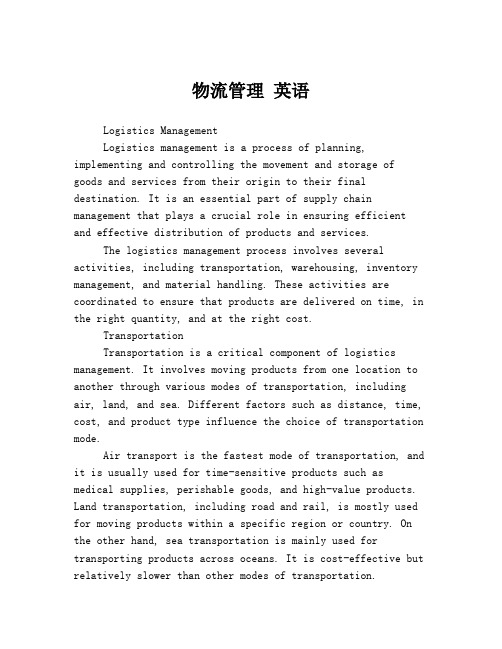
物流管理英语Logistics ManagementLogistics management is a process of planning, implementing and controlling the movement and storage of goods and services from their origin to their final destination. It is an essential part of supply chain management that plays a crucial role in ensuring efficient and effective distribution of products and services.The logistics management process involves several activities, including transportation, warehousing, inventory management, and material handling. These activities are coordinated to ensure that products are delivered on time, in the right quantity, and at the right cost.TransportationTransportation is a critical component of logistics management. It involves moving products from one location to another through various modes of transportation, including air, land, and sea. Different factors such as distance, time, cost, and product type influence the choice of transportation mode.Air transport is the fastest mode of transportation, and it is usually used for time-sensitive products such as medical supplies, perishable goods, and high-value products. Land transportation, including road and rail, is mostly used for moving products within a specific region or country. On the other hand, sea transportation is mainly used for transporting products across oceans. It is cost-effective but relatively slower than other modes of transportation.WarehousingWarehousing is the storage of products before they are transported to their final destination. Warehouses are used to store products for different reasons, including seasonal demand, economic order quantity, and better delivery efficiency. Efficient warehouse management ensures that products are stored in optimal conditions, and they are easy to locate and retrieve.Inventory ManagementInventory management involves monitoring the quantity, location, and movement of products in the supply chain. It ensures that products are always available when needed, and there are no stockouts. The inventory management process involves forecasting demand, ordering products, receiving and storing products, and managing inventory levels.Material HandlingMaterial handling involves moving products within the warehouse or distribution center. It includes picking products, packing products, and loading and unloading products from transportation vehicles. Efficient material handling is essential in ensuring that products are moved quickly and without damage.ConclusionLogistics management plays a significant role in the success of any business. It involves coordinating different activities, including transportation, warehousing, inventory management, and material handling, to ensure that products are delivered on time, in the right quantity, and at theright cost. Efficient logistics management leads to improved customer satisfaction, reduced costs, and increasedprofitability, which are essential for the long-term success of any organization.。
物流管理英文讲义-文档资料100页
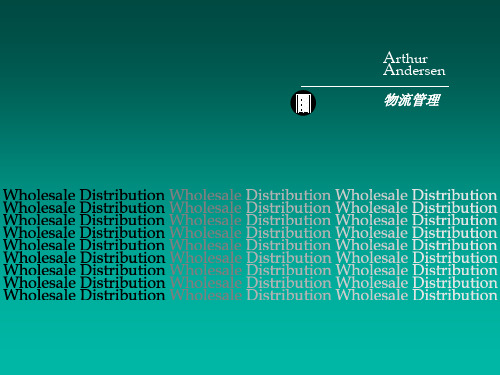
“Expected”
Quadrant I
“Proven”
Quadrant II
“Innovative”
Low
“Differentiated”
Low
GAP
High
Degree to which the practice provides differentiated
profitability or “gap” over non-users
5
Channel Formats
Manufacturer WholesalerDistributor
Customer
Manufacturer Service Providers
Based
“Door to Door”
Retailer Based Buyer Initiated
Third Party Influencers Point of Consumption Catalog & Technology- Merchandising
talent remains a challenge
12
Emerging Issues
Large companies still growing; small/medium companies turn to buying groups
Marketing alliances emerge Integrated supply programs flourish Some segments shift from supply “push”
Low
Need: - Small orders - Low cost Example: - Direct mail-catalog - Warehouse club
物流管理专用英语

物流管理专用英语 Document number:PBGCG-0857-BTDO-0089-PTT1998物流管理专用英语这里是物流管理33个专用英语,希望能给大家带来便利!1物品Article经济活动中涉及到实体流动的物质资料。
2物流Logistics物品从供应地向接收地的实体流动过程。
根据实际需要,将运输、储存、装卸、搬运、包装、流通加工、配送、信息处理等基本功能实施的有机结合。
3物流活动Logistics?activity物流诸功能的实施与管理过程。
4物流作业Logistics?operation实现物流功能时所进行的具体*作活动。
5物流模数Logistics?modulus物流设施与设备的尺寸基准。
6物流技术Logistics?technology物流活动中所采用的自然科学与社会科学方面的理论、方法,以及设? 施、设备、装置与工艺的总称。
7物流成本Logistics?cost物流活动中所消耗的物化劳动和活劳动的货币表现。
8物流管理Logistics?management为了以最低的物流成本达到用户所满意的服务水平,对物流活动进行的计划、组织、协调与控制。
9物流中心Logistics?center从事物流活动的场所或组织。
应基本符合下列要求:(1)主要面向社会服务;(2)物流功能健全;(3)完善的信息网络;(4)辐射范围大;(5)少品种、大批量;(6)存储、吞吐能力强;(7)物流业务统一经营、管理。
10物流网络Logistics?network物流过程中相互联系的组织与设施的集合。
11物流信息Logistics?information反映物流各种活动内容的知识、资料、图象、数据、文件的总称。
12物流企业Logistics?enterprise从事物流活动的经济组织。
13物流单证Logistics?document s物流过程中使用的所有单据、票据、凭证的总称。
14物流联盟Logistics?alliance两个或两个以上的经济组织为实现特定的物流目标而采取的长期联合与合作。
物流管理专业英语作文
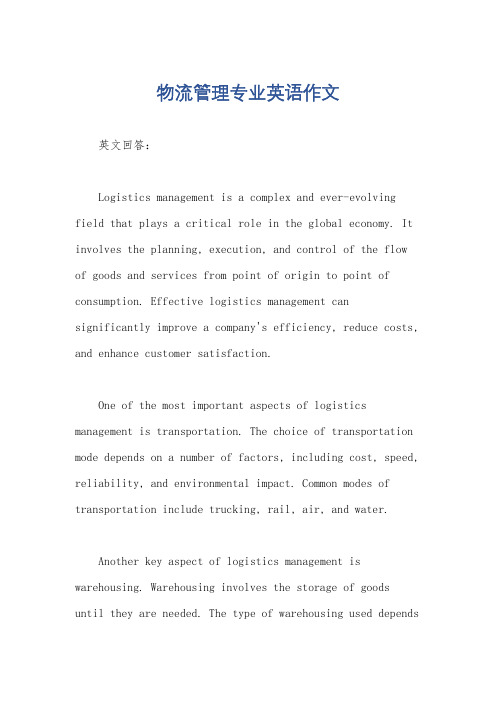
物流管理专业英语作文英文回答:Logistics management is a complex and ever-evolving field that plays a critical role in the global economy. It involves the planning, execution, and control of the flow of goods and services from point of origin to point of consumption. Effective logistics management cansignificantly improve a company's efficiency, reduce costs, and enhance customer satisfaction.One of the most important aspects of logistics management is transportation. The choice of transportation mode depends on a number of factors, including cost, speed, reliability, and environmental impact. Common modes of transportation include trucking, rail, air, and water.Another key aspect of logistics management is warehousing. Warehousing involves the storage of goodsuntil they are needed. The type of warehousing used dependson the type of goods being stored and the length of time they will be stored.Logistics managers also play a vital role in inventory management. Inventory management involves the planning and control of the flow of goods into and out of a company. The goal of inventory management is to maintain the optimal level of inventory to meet customer demand while minimizing costs.In addition to transportation, warehousing, and inventory management, logistics managers also handle a variety of other tasks, such as:Order processing.Demand forecasting.Customer service.Logistics technology.Logistics management is a challenging but rewarding field that offers a variety of opportunities for career growth. With the increasing globalization of the economy, the demand for qualified logistics professionals is expected to continue to grow.中文回答:物流管理专业。
物流管理-物流专业英语
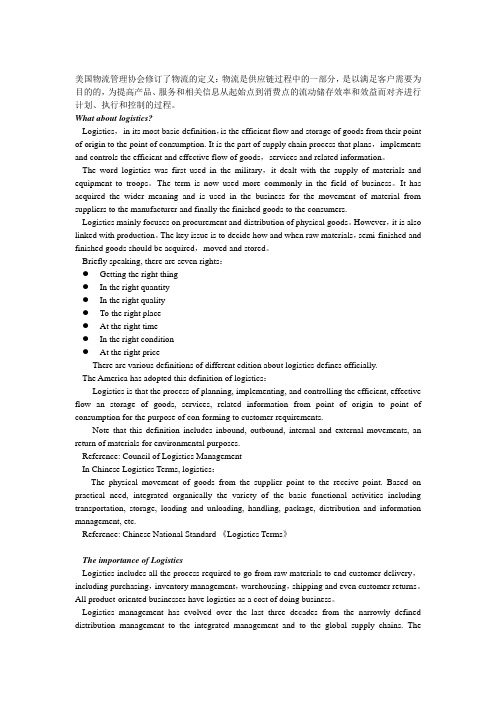
美国物流管理协会修订了物流的定义:物流是供应链过程中的一部分,是以满足客户需要为目的的,为提高产品、服务和相关信息从起始点到消费点的流动储存效率和效益而对齐进行计划、执行和控制的过程。
What about logistics?Logistics,in its most basic definition,is the efficient flow and storage of goods from their point of origin to the point of consumption. It is the part of supply chain process that plans,implements and controls the efficient and effective flow of goods,services and related information。
The word logistics was first used in the military,it dealt with the supply of materials and equipment to troops。
The term is now used more commonly in the field of business。
It has acquired the wider meaning and is used in the business for the movement of material from suppliers to the manufacturer and finally the finished goods to the consumers.Logistics mainly focuses on procurement and distribution of physical goods。
(完整版)物流专业英语课件.ppt

货物出库手续齐全;出库货物数量准 确;装卸规范;按出货单先后发放货物; 出库单据保存归档。
.....
15
Dialogue 1 Visiting a Warehouse
6.It consists of five aspects:the warehouse procedures, the quantity of the goods, load the goods and deposit them in standard, provide the goods according to the shipment list, save and file the bills of document.
• What is important here is this to move the product without any transfer in each process.
• How many types of the unit load size is composed ?
• What about using both the standardized container and pallet in the pool system?
物流管理英文的讲义 共100页

Agree/Strongly Agree
W/Ds need to understand
W/D
96%
their cost
S
96%
Sophisticated management information, and its use, will be key to success in future
to demand “pull” in Alternate channels shake out
13
What is AA
Doing in the Marketplace?
14
Questions to Answer
3 How are you using the FTFOC study?
3 Hot issues/activities for clients and targets
MATURITY
DECLINE
9
Reformation - Optimizing Core Competencies
Focus on reducing costs Focus on providing basic services Retention and penetration of
W/D
S
High ROTA
Today 2000 Today 2000 Today 2000
Completeness & reliability of deliveries 1
1
22
11
Competent outside salesperson Best value for the price
2
6
3
2
Reengineer the salesforce
英语作文-快递服务的物流管理与运营
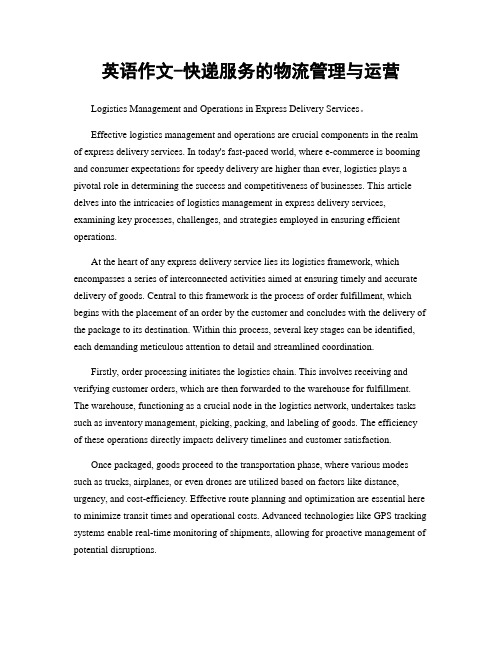
英语作文-快递服务的物流管理与运营Logistics Management and Operations in Express Delivery Services。
Effective logistics management and operations are crucial components in the realm of express delivery services. In today's fast-paced world, where e-commerce is booming and consumer expectations for speedy delivery are higher than ever, logistics plays a pivotal role in determining the success and competitiveness of businesses. This article delves into the intricacies of logistics management in express delivery services, examining key processes, challenges, and strategies employed in ensuring efficient operations.At the heart of any express delivery service lies its logistics framework, which encompasses a series of interconnected activities aimed at ensuring timely and accurate delivery of goods. Central to this framework is the process of order fulfillment, which begins with the placement of an order by the customer and concludes with the delivery of the package to its destination. Within this process, several key stages can be identified, each demanding meticulous attention to detail and streamlined coordination.Firstly, order processing initiates the logistics chain. This involves receiving and verifying customer orders, which are then forwarded to the warehouse for fulfillment. The warehouse, functioning as a crucial node in the logistics network, undertakes tasks such as inventory management, picking, packing, and labeling of goods. The efficiency of these operations directly impacts delivery timelines and customer satisfaction.Once packaged, goods proceed to the transportation phase, where various modes such as trucks, airplanes, or even drones are utilized based on factors like distance, urgency, and cost-efficiency. Effective route planning and optimization are essential here to minimize transit times and operational costs. Advanced technologies like GPS tracking systems enable real-time monitoring of shipments, allowing for proactive management of potential disruptions.Furthermore, the role of information technology cannot be overstated in modern logistics. Integrated systems handle order tracking, inventory management, and data analytics, providing insights that drive strategic decision-making. For instance, predictive analytics help anticipate demand surges, allowing companies to adjust inventory levels and staffing accordingly, thereby enhancing operational agility.Despite the benefits offered by advanced logistics systems, challenges persist. One significant issue is the management of last-mile delivery, which refers to the final leg of the delivery process—often the most complex and costly due to the intricacies of urban environments and varying customer preferences. Companies are increasingly exploring innovative solutions such as crowdshipping and autonomous vehicles to address these challenges and improve delivery efficiency.Moreover, globalization has expanded the scope of logistics operations, necessitating effective supply chain management across international borders. Cross-border logistics involves navigating customs regulations, tariffs, and diverse infrastructural landscapes, requiring robust partnerships with local service providers and adherence to international standards.In conclusion, effective logistics management and operations are indispensable for the success of express delivery services. By optimizing processes from order processing through to last-mile delivery, leveraging technology, and adapting to global complexities, companies can enhance efficiency, reduce costs, and meet the evolving demands of consumers. As the e-commerce sector continues to grow, the importance of logistics in delivering seamless customer experiences will only intensify, making continuous innovation and improvement imperative for businesses in this dynamic industry.。
物流管理介绍英文稿范文
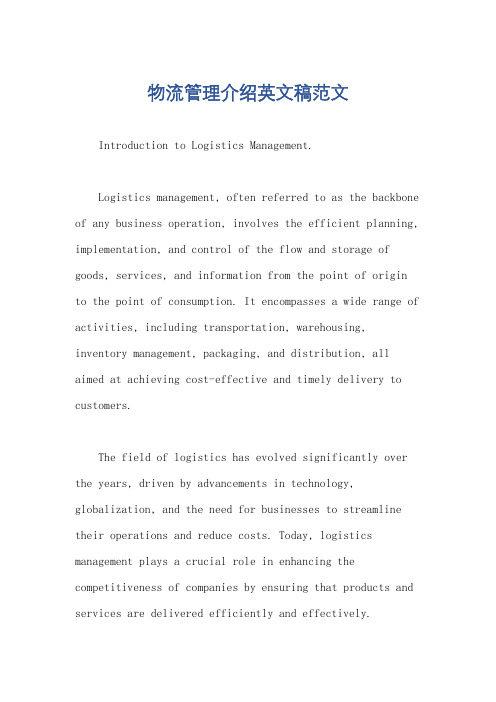
物流管理介绍英文稿范文Introduction to Logistics Management.Logistics management, often referred to as the backbone of any business operation, involves the efficient planning, implementation, and control of the flow and storage of goods, services, and information from the point of origin to the point of consumption. It encompasses a wide range of activities, including transportation, warehousing, inventory management, packaging, and distribution, all aimed at achieving cost-effective and timely delivery to customers.The field of logistics has evolved significantly over the years, driven by advancements in technology, globalization, and the need for businesses to streamline their operations and reduce costs. Today, logistics management plays a crucial role in enhancing the competitiveness of companies by ensuring that products and services are delivered efficiently and effectively.The Core Components of Logistics Management.1. Transportation Management: Transportation is a vital component of logistics management, as it involves the movement of goods and services from one location to another. Effective transportation management requires careful planning and execution to minimize costs, reduce delays,and ensure the integrity of the shipped goods. Various modes of transportation, such as road, rail, air, and water, are considered based on the nature of the goods, the distance to be covered, and the required time frame.2. Warehousing and Storage: Warehousing plays a crucial role in logistics management, as it involves the safe and secure storage of goods until they are ready for distribution. Warehouses must be designed to maximize storage capacity and efficiency, while also considering factors such as temperature control, humidity, and security. Effective warehousing management ensures that goods are stored in the optimal condition, reducing the risk of damage or spoilage.3. Inventory Management: Inventory management involves tracking and managing the stock of goods in a warehouse or distribution center. It ensures that the right amount of inventory is available at all times to meet customer demand, while also minimizing the cost of holding excess inventory. Inventory management systems utilize advanced techniques, such as just-in-time inventory and lean inventory management, to optimize inventory levels and improve efficiency.4. Packaging and Labeling: Packaging and labeling are essential elements of logistics management, as they protect goods during transportation and provide criticalinformation to facilitate their handling and delivery. Packaging must be strong enough to withstand the rigors of transit, while also being cost-effective andenvironmentally friendly. Labeling, on the other hand, ensures that goods are properly identified and tracked throughout the supply chain.5. Distribution Management: Distribution managementinvolves the planning and execution of the delivery ofgoods to customers. Effective distribution management requires careful consideration of factors such as route optimization, delivery timing, and the use of advanced technologies, such as GPS tracking and automated delivery systems. Distribution management also ensures that customers receive their orders in a timely and efficient manner, enhancing customer satisfaction and loyalty.The Importance of Logistics Management in Business.Logistics management plays a pivotal role in thesuccess of any business. Here are some of the key benefitsof effective logistics management:1. Cost Savings: Efficient logistics management helps businesses reduce costs by optimizing transportation routes, minimizing inventory holding costs, and reducing waste and damage during transportation and storage.2. Enhanced Customer Satisfaction: Timely and reliable delivery of goods and services is essential for maintainingcustomer satisfaction and loyalty. Effective logistics management ensures that customers receive their orders on time and in good condition, thereby enhancing their overall experience.3. Improved Supply Chain Visibility: Advanced logistics management systems provide real-time visibility into the supply chain, enabling businesses to track the status of their orders and identify potential bottlenecks or delays promptly. This enhanced visibility helps businesses make informed decisions and adjust their strategies accordingly.4. Competitive Advantage: Effective logistics management can give businesses a competitive edge by enabling them to offer better service, reduce costs, and improve efficiency. By streamlining their logistics operations, companies can differentiate themselves from their competitors and attract more customers.Conclusion.In conclusion, logistics management is a crucial aspectof any business operation. It involves the planning, implementation, and control of the flow and storage of goods, services, and information to ensure efficient and cost-effective delivery to customers. Effective logistics management can help businesses reduce costs, enhance customer satisfaction, improve supply chain visibility, and gain a competitive edge. As globalization continues to grow and technology continues to advance, the importance of logistics management will only increase. Therefore, it is essential for businesses to invest in robust logistics management systems and strategies to stay ahead in today's competitive landscape.。
物流管理英文的讲义

CHANGE
Transforming Your Business With
Best Practices
NAW
DREF
16
Objectives of the Study
To provide a compilation of critical trends for management to use in strategic planning efforts
Other Channels
8
Extension of the Life Cycle Concept: Reformation and Transformation
INTRODUCTION GROWTH
Transformation
MATURITY
DECLINE
Reformation
INTRODUCTION GROWTH
19
Understanding Markets & Customers
20
Key Messages
Wholesaler-distributors must create and use formal methods to gain customer feedback and improve communication.
Obtain Materials & Supplies Mng. Inventories & Deliveries
Develop Human Resources
18
Best Practices Matrix
High
Quadrant IV Quadrant III
USAGE
Degree to which the practice is employed
物流管理专业介绍英文稿范文

物流管理专业介绍英文稿范文Logistics Management: A Comprehensive Overview.Logistics management encompasses the intricate coordination of activities involved in the movement, storage, and handling of goods, information, and other resources from point of origin to point of consumption. It plays a pivotal role in ensuring efficient and cost-effective delivery of products and services across global supply chains.Scope of Logistics Management.Logistics management involves a wide range of functions, including:Transportation Management: Planning and executing the movement of goods via various modes of transport, such as road, rail, air, and sea.Warehousing Management: Managing the storage and inventory of goods in warehouses and distribution centers.Inventory Management: Optimizing inventory levels to minimize costs while ensuring product availability.Distribution Management: Coordinating the flow of goods from warehouses to customers and other distribution channels.International Logistics: Handling the unique challenges and regulations associated with cross-border movement of goods.Supply Chain Management: Integrating logistics processes with other supply chain functions, such as procurement, production, and sales.Logistics Technology: Utilizing software and other technologies to enhance efficiency and visibility in logistics operations.Importance of Logistics Management.Effective logistics management is crucial for businesses of all sizes for several reasons:Reduced Costs: Optimizing logistics processes can significantly reduce transportation, warehousing, and inventory costs.Improved Customer Service: Efficient logisticsdelivery ensures timely and reliable delivery of products, enhancing customer satisfaction.Increased Agility: Agile logistics systems enable businesses to respond quickly to changing market demands and unforeseen disruptions.Competitive Advantage: Superior logistics capabilities provide businesses with a competitive edge by reducing lead times and improving product availability.Environmental Sustainability: Efficient logisticspractices can reduce energy consumption, emissions, and waste, contributing to environmental sustainability.Careers in Logistics Management.The field of logistics management offers a diverse range of career opportunities, including:Logistics Manager: Oversees overall logistics operations, including transportation, warehousing, and distribution.Transportation Manager: Manages transportation activities, including carrier selection, routing, and freight negotiations.Warehouse Manager: Supervises warehouse operations, including inventory management, storage, and order fulfillment.Inventory Analyst: Develops and maintains inventory plans to optimize stock levels and minimize costs.Supply Chain Analyst: Analyzes and improves supply chain processes, including logistics, procurement, and manufacturing.Education and Training.A bachelor's degree in logistics management, supply chain management, or a related field is typically required for entry-level positions in logistics management. Master's programs in logistics and supply chain management provide advanced knowledge and skills for leadership roles. Industry certifications, such as the Certified Logistics Professional (CLP), demonstrate expertise and professional development.Conclusion.Logistics management is a critical discipline that plays a pivotal role in global supply chains. It encompasses a wide range of functions, from transportation and warehousing to inventory management and distribution.Effective logistics management can significantly reduce costs, improve customer service, and provide businesses with a competitive advantage. Careers in logistics management offer diverse opportunities, and education and training options are available to prepare individuals for success in this dynamic field.。
介绍物流专业作文英文
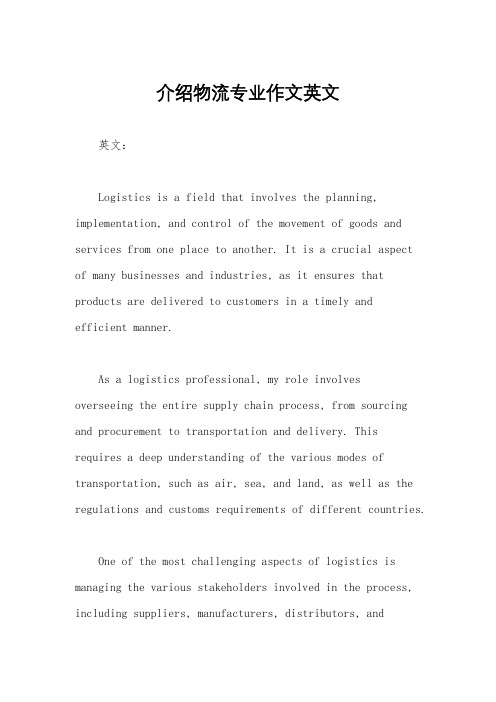
介绍物流专业作文英文英文:Logistics is a field that involves the planning, implementation, and control of the movement of goods and services from one place to another. It is a crucial aspectof many businesses and industries, as it ensures that products are delivered to customers in a timely andefficient manner.As a logistics professional, my role involvesoverseeing the entire supply chain process, from sourcing and procurement to transportation and delivery. Thisrequires a deep understanding of the various modes of transportation, such as air, sea, and land, as well as the regulations and customs requirements of different countries.One of the most challenging aspects of logistics is managing the various stakeholders involved in the process, including suppliers, manufacturers, distributors, andcustomers. Effective communication and collaboration are key to ensuring that everyone is on the same page and that any issues are addressed quickly and efficiently.Another important aspect of logistics is the use of technology and automation to streamline processes and improve efficiency. This includes the use of warehouse management systems, transportation management systems, and other software tools that help to track and manage inventory, shipments, and delivery schedules.Overall, logistics is a dynamic and ever-changing field that requires a combination of technical expertise, communication skills, and problem-solving abilities. It is a rewarding career for those who enjoy working in a fast-paced environment and are passionate about delivering products and services to customers around the world.中文:物流是涉及到从一个地方到另一个地方的货物和服务的规划、实施和控制的领域。
物流管理英文的讲义

Low
Need: - Small orders - Low cost Example: - Direct mail-catalog - Warehouse club
Low
Traditional WholesalerDistributor’s Customers
Need: - Customer quality &unique product/service concerns Example: - Specialty distribution - Focus on one of product, service, customer, location
Focus on revenue growth
Increased importance of innovative value-added services
Strategic alliances for integrated supply
Emphasis on reinventing the business and redeploying the workforce
Other Channels
8
Extension of the Life Cycle Concept: Reformation and Transformation
INTRODUCTION GROWTH
Transformation
MATURITY
DECLINE
Reformation
INTRODUCTION GROWTH
of
CHANGE
Transforming Your Business With
Best Practices
NAW
DREF
物流管理专业英语自我介绍_英文自我介绍_
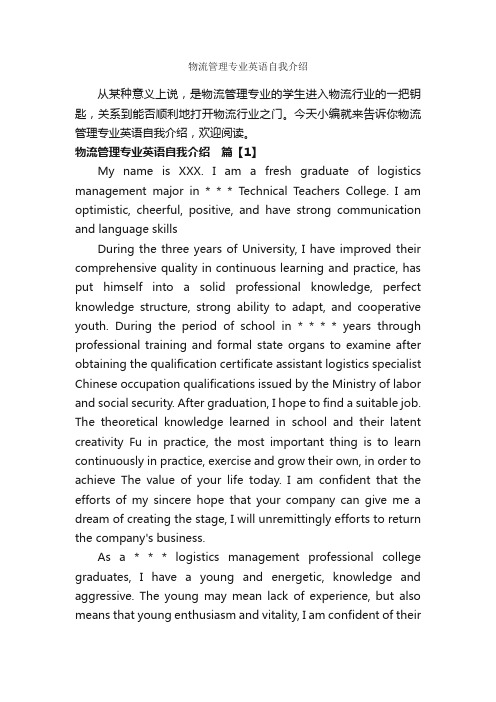
物流管理专业英语自我介绍从某种意义上说,是物流管理专业的学生进入物流行业的一把钥匙,关系到能否顺利地打开物流行业之门。
今天小编就来告诉你物流管理专业英语自我介绍,欢迎阅读。
物流管理专业英语自我介绍篇【1】My name is XXX. I am a fresh graduate of logistics management major in * * * Technical Teachers College. I am optimistic, cheerful, positive, and have strong communication and language skillsDuring the three years of University, I have improved their comprehensive quality in continuous learning and practice, has put himself into a solid professional knowledge, perfect knowledge structure, strong ability to adapt, and cooperative youth. During the period of school in * * * * years through professional training and formal state organs to examine after obtaining the qualification certificate assistant logistics specialist Chinese occupation qualifications issued by the Ministry of labor and social security. After graduation, I hope to find a suitable job. The theoretical knowledge learned in school and their latent creativity Fu in practice, the most important thing is to learn continuously in practice, exercise and grow their own, in order to achieve The value of your life today. I am confident that the efforts of my sincere hope that your company can give me a dream of creating the stage, I will unremittingly efforts to return the company's business.As a * * * logistics management professional college graduates, I have a young and energetic, knowledge and aggressive. The young may mean lack of experience, but also means that young enthusiasm and vitality, I am confident of theirown abilities and knowledge in the work after graduation and overcome various difficulties in life, constantly the value of life and the pursuit of the goal. The intentions of the recommendation, but on their own factory processing packaging simple, the quality of their own functions and look forward to you through the use of verification, if I am not you with the goods, do not return, because you only need to put the ads are discarded, it does not need any inventory Cost.物流管理专业英语自我介绍篇【2】good morning !I’m and from .My specailty is logistics engineering.it is really a great honor to have this opportunity for a interview,I would like to answer whatever you may raise,and i hope i can make a good performance today,eventually enroll in this prestigious university in september. now i will introduce myself briefly.I am years old,born in Guangdong province,and i am curruently a senior student at beijing uni.my major is .i spend most of my time on study,i have passed cet4/6 with a easy. and i have acquired basic knowledge of and both in theory and in practice. so i will work hard,i hope you will like my introduce.thank you!物流管理专业英语自我介绍篇【3】Hello, my name is, I want to apply for the company's logistics management positions, my character more cheerful, optimistic, good at getting along with people; with strong sense of teamwork, able to recognize the strengths of others, learn and accept the opinions of others; have positive work attitude and be willing and able to work hard.I am responsible for the work, can bear hardships and standhard work; strong ability of English, fluent spoken and written English; have a strong ability to learn about new things, and can have certain innovation in learning basis. In University majored in logistics, and practice in the related service industry and sales company, so happy in this promising industry in the planning and development of their own.If I have a chance to work in your company, I will try to do in the process of construction, improve the efficiency of logistics operation, reduce the cost of logistics company; supplier and procurement management, establish and optimize the material procurement process; warehouse management, according to the development of the company and material characteristic of logistics, establish warehousing companies. Turnover warehouse management system, improve the efficiency in the use of company goods; transportation management, establish the cargo transportation system, cargo allocation and scheduling planning of the company; sales and marketing support, support sales and marketing, logistics cost analysis, budget and control, improve Customer satisfaction; optimization of logistics system, constantly improve the logistics system, improve logistics efficiency, reduce the occupation of funds, improve service, reduce logistics costs and enhance logistics company competitiveness; administrative departments, according to the strategy and value orientation of the development of the company, combining with the characteristics of logistics business, to carry out the construction of organization and personnel, in order to achieve the continuous appreciation of human capital.。
- 1、下载文档前请自行甄别文档内容的完整性,平台不提供额外的编辑、内容补充、找答案等附加服务。
- 2、"仅部分预览"的文档,不可在线预览部分如存在完整性等问题,可反馈申请退款(可完整预览的文档不适用该条件!)。
- 3、如文档侵犯您的权益,请联系客服反馈,我们会尽快为您处理(人工客服工作时间:9:00-18:30)。
物流管理专用英语物流管理专业介绍
物流管理专用英语这里是物流管理33个专用英语,希望能给大家带来便利!
1物品Article 经济活动中涉及到实体流动的物质资料。
2物流Logistics 物品从供应地向接收地的实体流动过程。
根据实际需要,将运输、储存、装卸、搬运、包装、流通加工、配送、信息处理等基本功能实施的有机结合。
3物流活动Logistics activity 物流诸功能的实施与管理过程。
4物流作业Logistics operation 实现物流功能时所进行的具体_作活动。
5物流模数Logistics modulus 物流设施与设备的尺寸基准。
6物流技术Logistics technology 物流活动中所采用的自然科学与社会科学方面的理论、方法,以及设施、设备、装置与工艺的总称。
7物流成本Logistics cost 物流活动中所消耗的物化劳动和活劳动的货币表现。
8物流管理Logistics management 为了以最低的物流成本达到用户所满意的服务水平,对物流活动进行的计划、组织、协调与控制。
9物流中心Logistics center 从事物流活动的场所或组织。
应基本符合下列要求:
(1)主要面向社会服务;
(2)物流功能健全;
(3)完善的信息网络;
(4)辐射范围大;
(5)少品种、大批量;
(6)存储、吞吐能力强;
(7)物流业务统一经营、管理。
10物流网络Logistics work 物流过程中相互联系的组织与设施的集合。
11物流信息Logistics information 反映物流各种活动内容的知识、资料、图象、数据、文件的总称。
12物流企业Logistics enterprise 从事物流活动的经济组织。
13物流单证Logistics documents 物流过程中使用的所有单据、票据、凭证的总称。
14物流联盟Logistics alliance 两个或两个以上的经济组织为实现特定的物流目标而采取的长期联合与合作。
15供应物流Supply logistics 为生产企业提供原材料、零部件或其他物品时,物品在提供者与需求者之间的实体流动。
16生产物流Production logistics 生产过程中,原材料、在制品、半成品、产成品等,在企业内部的实体流动。
17销售物流Distribution logistics 生产企业、流通企业出售商品时,物品在供方与需方之间的实体流动。
18回收物流Returned logistics 不合格物品的返修、退货以及周转使用的包装容器从需方返回到供方所形成的物品实体流动。
19废弃物物流Waste material logistics 将经济活动中失去原有使用价值的物品,根据实际需要进行收集、分类、加工、包装、搬运、储存等,并分送到专门处理场所时所形成的物品实体流动。
20 绿色物流Environmental logistics 在物流过程中抑制物流对环境造成危害的同时,实现对物流环境的净化,使物流资源得到最充分利用。
21企业物流Internal logistics 企业内部的物品实体流动。
22社会物流E_ternal logistics 企业外部的物流活动的总称。
23军事物流Military logistics 用于满足军队平时与战时需要的物流活动。
24国际物流International logistics 不同国家(地区)之间的物流。
25第三方物流Third-part logistics(TPL)由供方与需方以外的物流企业提供物流服务的业务模式。
26定制物流Customized logistics 根据用户的特定要求而为其专门设计的物流服务模式。
27虚拟物流
Virtual logistics 以计算机网络技术进行物流运作与管理,实现企业间物流资源共享和优化配置的物流方式。
28增值物流服务value-added logistics service 在完成物流基本功能基础上,根据客户需求提供的各种延伸业务活动。
29供应链Supply chain 生产及流通过程中,涉及将产品或服务提供给最终用户活动的上游与下游企业,所形成的网
链结构。
30条码Bar code 由一组规则排列的条、空及字符组成的、用以表示一定信息的代码。
同义词:条码符号bar code symbol[GB/T 4122.1-1996中4.17] 31电子数据交换Electronic data interchange (EDI)通过电子方式,采用标准化的格式,利用计算机网络进行结构化数据的传输和交换。
32有形损耗Tangible loss 可见或可测量出来的物理性损失、消耗。
33无形损耗Intangible loss 由于科学技术进步而引起的物品贬值。
